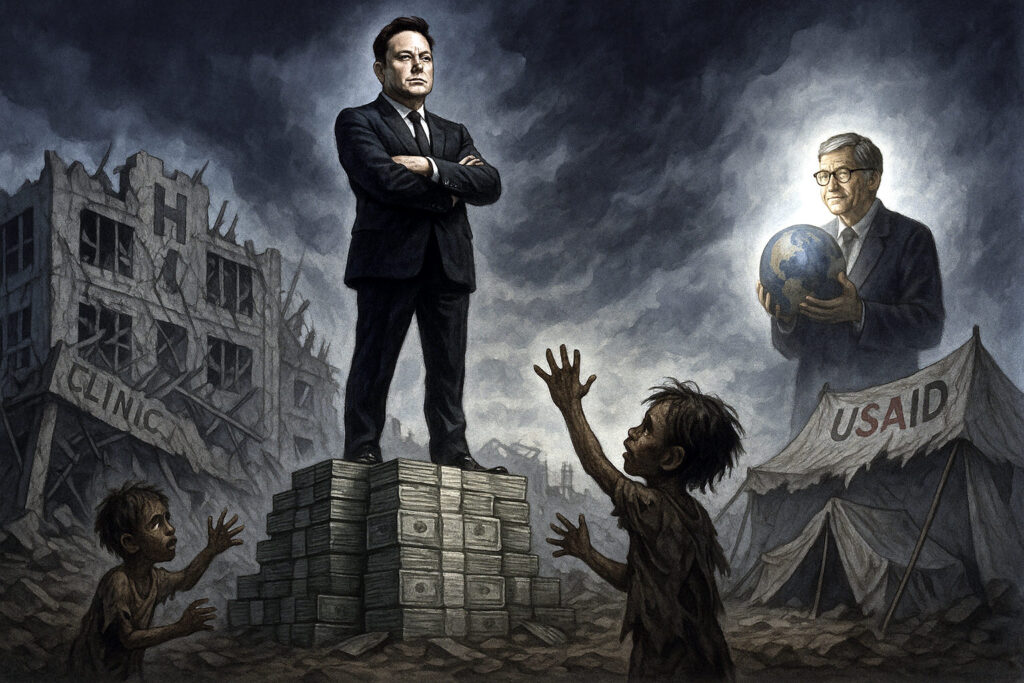 If there was ever a moment that laid bare the hollowness of billionaire benevolence, it happened in May 2025. Bill Gates, co-founder of Microsoft and a self-styled savior of the world’s most vulnerable, came out swinging against Elon Musk in a blistering interview with the Financial Times. Gates accused Musk—the world’s richest man—of having blood on his hands, claiming that Musk’s influence over USAID cuts is, quite literally, killing the world’s poorest children.
If there was ever a moment that laid bare the hollowness of billionaire benevolence, it happened in May 2025. Bill Gates, co-founder of Microsoft and a self-styled savior of the world’s most vulnerable, came out swinging against Elon Musk in a blistering interview with the Financial Times. Gates accused Musk—the world’s richest man—of having blood on his hands, claiming that Musk’s influence over USAID cuts is, quite literally, killing the world’s poorest children.
Gates didn’t mince words. “The picture of the world’s richest man killing the world’s poorest children is not a pretty one.” It was a stark statement, the kind that strips away the polished veneer of wealth and philanthropy and reveals the raw, rotting core beneath. For Gates, it was more than just rhetoric; it was a call to confront what he sees as the moral bankruptcy of Musk’s so-called ‘efficiency’ initiatives.
DOGE: Efficiency or Evisceration?
Musk’s Department of Government Efficiency (DOGE)—because what better name for slashing aid programs than after a meme?—was championed as a revolution in government spending. In reality, it’s been more of a sledgehammer than a scalpel, hacking away at programs designed to keep the world’s most vulnerable alive. Mozambique’s HIV prevention programs? Slashed. Vaccination campaigns in Africa? Gutted. All under the guise of ‘cutting bloat’ and ‘eliminating waste.’
Musk defends the cuts as a necessary purge of corruption and waste. He claims that USAID has been a sieve for taxpayer money, lining the pockets of corrupt officials rather than reaching those in need. Maybe there’s some truth to that. But let’s be clear: when you yank the safety net out from under a child suffering from polio, it’s not corruption that kills them—it’s the absence of care. Gates knows this. He’s been in the villages, seen the devastation firsthand. For Musk, it seems, poverty is just another abstraction, something to be optimized.
Two Visions, One Planet
This isn’t just a spat between billionaires—it’s a fundamental clash of ideology. Gates believes that structured, government-backed aid is the only way to combat poverty at scale. His foundation, alongside the World Health Organization and UNICEF, has poured billions into disease prevention, clean water initiatives, and education. For Gates, these aren’t just numbers on a ledger; they’re lives.
Musk, on the other hand, is a Silicon Valley evangelist for disruption. His vision for philanthropy is more technocratic—more Mars colony, less malaria vaccine. Through DOGE, Musk is attempting to reframe government as a business, one where efficiency trumps empathy and where suffering is just another statistic to be minimized, not eradicated.
Collateral Damage, Measured in Children
The numbers are stark. UNICEF estimates that USAID cuts have directly led to the cessation of life-saving programs in at least eight countries, with tens of thousands of child deaths predicted as a result. Gates, in a bold counterpunch, announced he would donate 99% of his wealth—over $200 billion—by 2045, a desperate bid to counteract what he sees as Musk’s ‘dangerous experiment.’
But let’s not sugarcoat this. Gates isn’t a saint. He’s wielding his wealth as a weapon, just as Musk is wielding his as a bulldozer. It’s just that Gates’ weapon of choice is a syringe and a bag of rice, while Musk’s is a ledger and a press release. The stakes are life and death, and the players are as colossal as they are cavalier.
As the world watches, it’s not just a debate over dollars and data—it’s a battle over the very nature of survival. And in that battle, the poorest children of the world are not just statistics; they’re the casualties of billionaire ambition.
Some believe that life is worth more than ledger lines.

